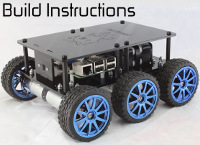Faulty PicoBorg Reverse
Forums:
I seem to have a faulty PBR. The Raspberry Pi isn't recognising the board. After running PBR.Init() I get the error:
Loading PicoBorg Reverse on bus 1, address 44 Missing PicoBorg Reverse at 44 PicoBorg Reverse was not found Trying bus 0 instead Loading PicoBorg Reverse on bus 0, address 44 Traceback (most recent call last): File "test.py", line 3, in PBR.Init() File "/home/pi/picoborgrev/PicoBorgRev.py", line 264, in Init self.Init(False) File "/home/pi/picoborgrev/PicoBorgRev.py", line 234, in Init self.bus = smbus.SMBus(self.busNumber) IOError: [Errno 2] No such file or directory
I had the same problem with this controller a few months ago, and I sent the board to be repaired. After the repair it functioned properly, but now it has stopped working again.
Would you please send me a replacement board?
(I need to finish the project by the end of the week, ideally, because it's a college project that will be assessed on the first week of September.)
- Log in to post comments



piborg
Tue, 08/23/2016 - 11:33
Permalink
Strange issue
It seems very strange that the problem you were having before has resurfaced.
From memory it seemed to be a fault with the on-board logic that we have not seen from any other board to date.
Can you answer the following questions for us:
sudo i2cdetect -y 1tuli
Tue, 08/23/2016 - 13:09
Permalink
Test results
sudo i2cdetect -y 1is:0 1 2 3 4 5 6 7 8 9 a b c d e f 00: -- -- -- -- -- -- -- 0a -- -- -- -- -- 10: -- -- -- -- -- -- -- -- -- -- -- -- -- -- -- -- 20: -- -- -- -- -- -- -- -- -- -- -- -- -- -- -- -- 30: -- -- -- -- -- -- -- -- -- -- -- -- -- -- -- -- 40: -- -- -- -- -- -- -- -- -- -- -- -- -- -- -- -- 50: -- -- -- -- -- -- -- -- -- -- -- -- -- -- -- -- 60: -- -- -- -- -- -- -- -- -- -- -- -- -- -- -- -- 70: -- -- -- -- -- -- -- --piborg
Tue, 08/23/2016 - 13:31
Permalink
Possibility of changed address
It is fairly likely that the
0aresponse is from the board.It may simply have had an address change programmed.
What result do you get from opening python:
Then running these commands:
tuli
Tue, 08/23/2016 - 13:37
Permalink
Result
The result is:
piborg
Tue, 08/23/2016 - 14:13
Permalink
That is good news
That means the PicoBorg Reverse is still functioning, it just has a different address from normal :)
You can reset the address to the default using these Python commands:
After doing that your scripts should start working again.
tuli
Tue, 08/23/2016 - 14:18
Permalink
Result!
The PicoBorg Reverse now works! Thank you for your help.